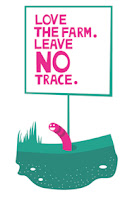Glastonbury are also investing in renewable power and low energy solutions by using a combination of “Orion” solar generators and modern PA and LED technology where possible. This green technology at the Festival will save over a tonne of carbon emissions this year.
 In addition to these numerous commitments to limiting the environmental impact of the festival, this year sees the advent of Glastonbury Festival’s “Green Traveller” initiative. To help lower carbon emissions and to raise awareness about the need to tackle climate change, the Festival is supporting people who choose to come to Somerset by public transport or bicycle. Over 50% of Glastonbury Festival’s CO2 emissions come from how the Festival goer makes their way to the site, so ticket holders who arrive at the Festival by public transport or bicycle will be given a Green Traveller lanyard. This rewards their journey with ways to make their Festival experience slightly more comfortable, such as vouchers for discounts on food and access to solar showers and compost toilets. They aim to get a third of Festival goers to arrive by train or coach – and perhaps encourage them to think about how they use their cars for the rest of the year too.
In addition to these numerous commitments to limiting the environmental impact of the festival, this year sees the advent of Glastonbury Festival’s “Green Traveller” initiative. To help lower carbon emissions and to raise awareness about the need to tackle climate change, the Festival is supporting people who choose to come to Somerset by public transport or bicycle. Over 50% of Glastonbury Festival’s CO2 emissions come from how the Festival goer makes their way to the site, so ticket holders who arrive at the Festival by public transport or bicycle will be given a Green Traveller lanyard. This rewards their journey with ways to make their Festival experience slightly more comfortable, such as vouchers for discounts on food and access to solar showers and compost toilets. They aim to get a third of Festival goers to arrive by train or coach – and perhaps encourage them to think about how they use their cars for the rest of the year too.


No comments:
Post a Comment